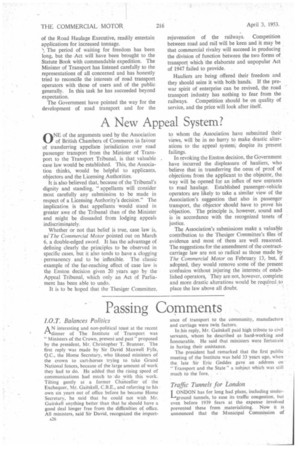Passing Comments
Page 28

Page 29

If you've noticed an error in this article please click here to report it so we can fix it.
1.0.T. Balances Politics
A N interesting and non-political toast at the recent
dinner of The Institute of Transport was " Ministers of the Crown, present and past" proposed by the president, Mr. Christopher T. Brunner. The first reply •was made by Sir David Maxwell Fyfe, Q.C., the Home Secretary, who likened ministers of the crown to cart-horses trying to take Grand National fences, because of the large amount of work they had to do. He added that the rising speed of communications had much to do with this work. Tilting gently at a former Chancellor of the Exchequer, Mr. Gaitskell, C.B.E,, and referring to his own six years out of office before he became Home Secretary, he said that he could not wish Mr. Gaitskell anything better than that he should have a good deal longer free from the difficulties of office. All ministers, said Sir David, recognized the import A26 ance of transport to the community, manufacture and carriage were twin factors.
In his reply, Mr. Gaitskell paid high tribute to civil servants, whom he described as hard-working and honourable. He said that ministers were fortunate in having their assistance.
The president had remarked that the first public meeting of the Institute was held 33 years ago, when the late Sir Eric Geddes gave an address on "Transport and the State " a subject which was still much to the fore.
Traffic Tunnels for London
LONDON has for long had plans, including underground tunnels, to ease its traffic congestion, but even before 1939 fears at the expense involved prevented these from materializing. Now it is announced that the Municipal Commission of
Casablanca, French Morocco, is planning to build four underground tunnels for a similar reason. Those who control such matters in our metropolis would have little more than clay to deal with', that is why boring for the underground railways was comparatively easy, but apparently their feet are of the same material.
Operating in Scandinavia
THE chief engine designer of the Swedish Volvo
concern, Mr. J. Stalblad, recently addressed a meeting of the technical society of C.A.V., Ltd. The subject he chose was "Vehicle Operating Conditions in Scandinavia, and their operation there and in Finland," Whereas summer conditions were much the same as those in Britain, he said, in winter and particularly during the thaw, the roads became extremely difficult. For instance, in supplying milk to Kiruna, the most northerly town in Sweden, the vehicles covered some 400 miles daily on almost deserted roads, where help could scarcely be expected.
Temperatures varied from 19.5 degrees F. in the extreme south to 8.5 degrees F. at-Gothenburg, and —43 degrees in the extreme north of Sweden. Water temperatures as low as —67 degrees F. have occurred in Finnish Lapland, whilst —40 degrees, combined with strong winds, is a common occurrence there.
Most main roads in Norway and Sweden were surfaced with gravel and sand, and to obviate dust, the principal gravel roads were sprayed with calcium chloride or sulphite lye in summer. These binding media were sometimes mixed with clay, spread out and-moistened. In rain, such roads became slippery and muddy. Dust made heavy demands on all filters, whilst the chemicals might damage chassis parts.
To reduce the viscosity of oil fuel, it was sometimes mixed with 20-30 per cent. of paraffin, and in extreme cold, fuel tanks were warmed by exhaust gas passed through copper coils. A pint of denatured alcohol in the oil fuel would prevent water condensation in the tank.
A Knobby Idea nNE of the most attractive Coronation novelties
for motor vehicles is the Safeti-Glow width indicator, which combines a good appearance with usefulness. Into special bracket clips inserted under the headlamp glasses are fitted clear-plastic masts about 14 in. long, each of which carries a red plastic knob and a neat, detachable Union Jack. The plastic has the quality of conveying the light from the headlamps through the masts to the knobs, which glow brightly. An advantage is that if theft be feared, a mast can quickly be removed by loosening one screw. Obtainable from garages and accessory stores, the price complete of this Wingard product is 9s, lad.




























































































